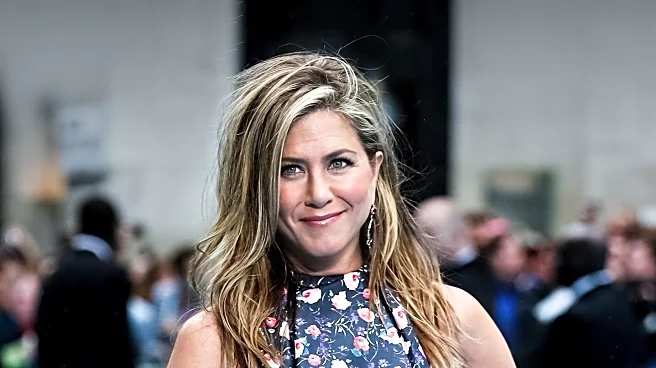What's Happening?
Jennifer Aniston, known for her role in 'Friends,' recently shared insights into her personal journey regarding motherhood on the 'Armchair Expert' podcast. Despite facing fertility struggles, Aniston expressed
contentment with not having children, emphasizing her desire for biological offspring rather than adoption. She revealed that her attempts to conceive included in vitro fertilization and other methods over two decades. Aniston addressed public perceptions of her decision, noting the emotional impact of societal narratives labeling her as selfish or a workaholic. Her candid discussion highlights the complexities of personal choices in the face of public scrutiny.
Why It's Important?
Aniston's openness about her fertility struggles and decision not to adopt sheds light on the broader societal pressures women face regarding motherhood. Her story resonates with many individuals who encounter similar challenges, offering a perspective that validates personal choices and the emotional journey involved. By discussing her experiences publicly, Aniston contributes to a dialogue about reproductive health and the diverse paths to family building, potentially encouraging greater empathy and understanding. Her narrative challenges stereotypes and promotes acceptance of varied life choices, impacting societal attitudes towards women and motherhood.
What's Next?
Aniston's revelations may inspire further conversations about reproductive health and the societal expectations placed on women. As public figures share their personal experiences, there could be increased advocacy for reproductive rights and support systems for individuals facing fertility challenges. Additionally, Aniston's story might encourage media outlets and the public to approach discussions about personal choices with greater sensitivity and respect, fostering a more inclusive environment for diverse narratives.
Beyond the Headlines
Aniston's decision not to adopt, despite fertility struggles, highlights the ethical considerations surrounding adoption and the desire for biological connection. Her story prompts reflection on the societal narratives that influence personal decisions and the importance of respecting individual autonomy. The discussion also underscores the need for comprehensive reproductive health education and support, addressing the emotional and physical aspects of fertility challenges.











